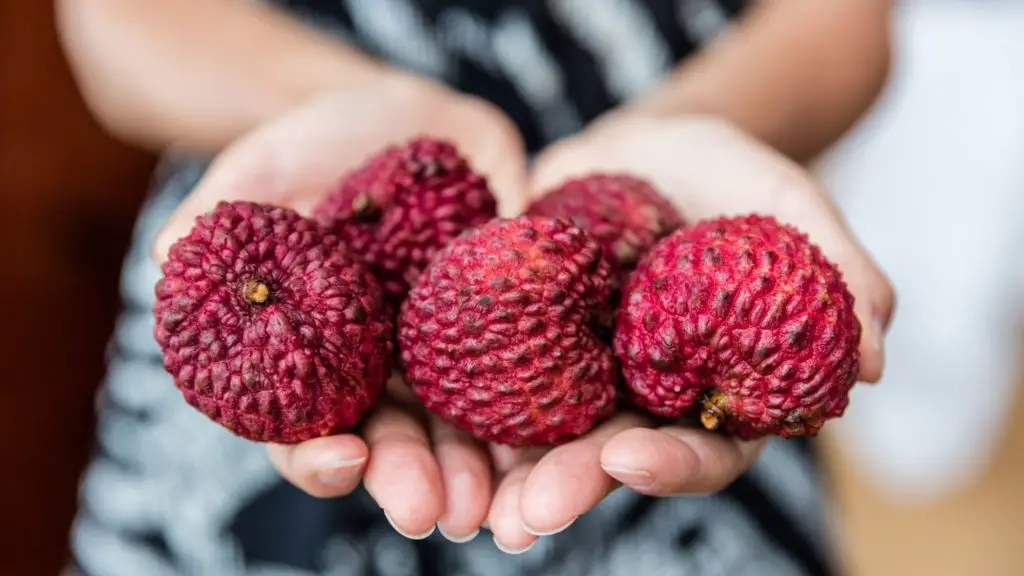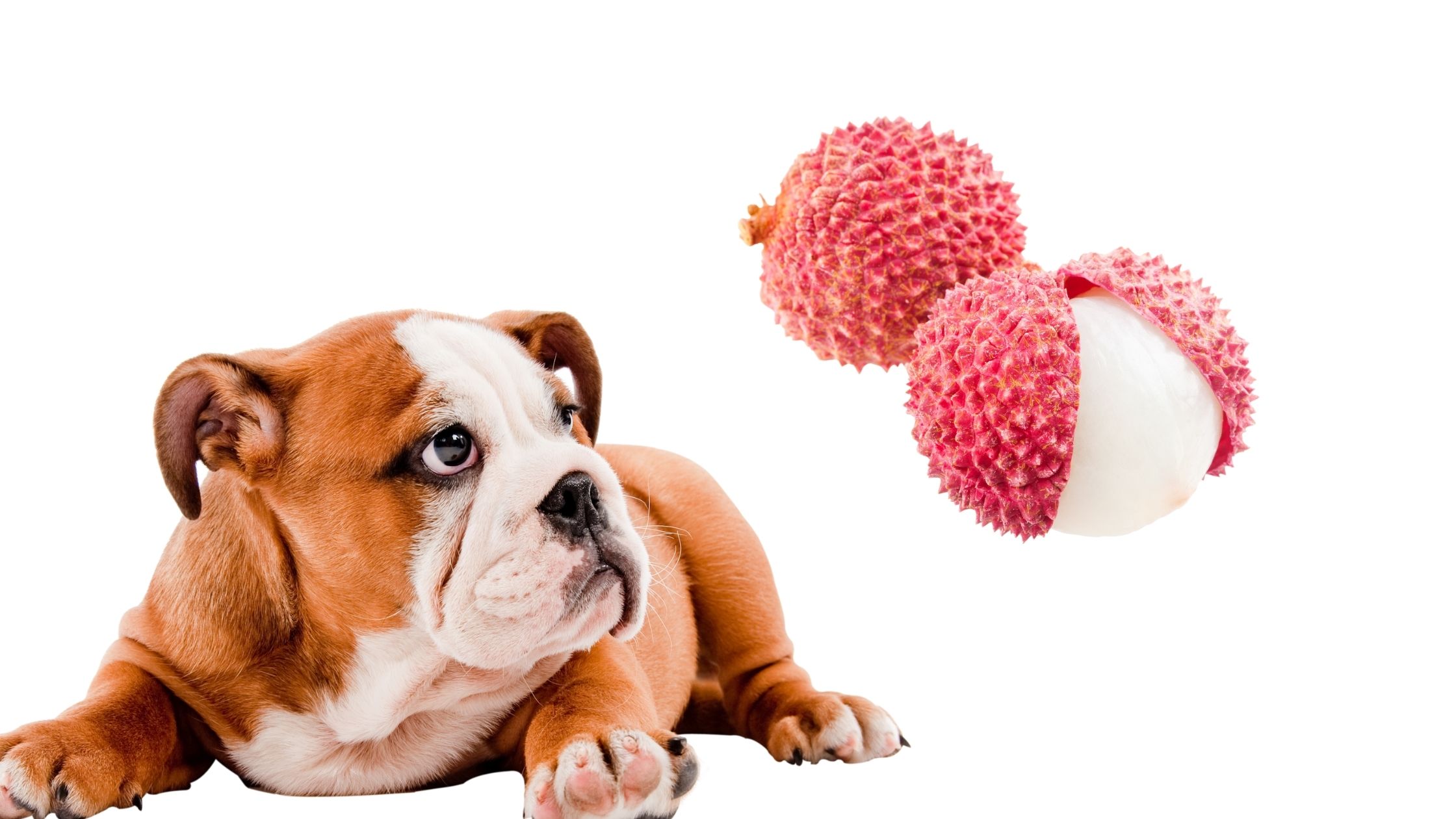Last Updated on 11/17/2021 by Veronica Jones
Dogs will eat almost anything that you put in front of them. They enjoy eating without knowing that some of those snacks can be bad for them. Fruits, such as lychee which is also known as Chinese strawberry, contain several nutrients and are considered a natural diuretic for your dogs. So, can a dog eat lychee fruit?
What other health benefits can dogs get from it? Can it also cause something bad to happen?
Can Dogs Eat Lychee Fruit?

Yes, dogs can safely eat small amounts of lychee. Dogs love the sweet flavor of lychee. Lychee can serve as a natural alternative to their treats. You just have to make sure that the lychee is ripe already. Do not feed them whole lychee, the pits (seed), and the lychee skin to avoid a choking hazard and indigestion.
They can only eat the edible flesh of it. Lychee fruit has juicy flesh that contains antioxidants and lots of essential vitamins that can be good for your dog. However, you must not overfeed them with this fleshy fruit as it can also cause upset stomachs and food poisoning to your dog.
Before giving them any, it is better to ask your vet for the right amount and size.
How Much Lychee Fruit Can Dogs Eat?

You can give your dog as much as half of the ripe lychee per day. A lychee peel should not be eaten. You also need to cut it into small pieces to avoid choking. Lychee should only be considered as an occasional treat and not part of their meal. Feeding lychee to your dog should only be at least once or twice a week.
Before giving your dogs lychees for the second time, observe their reaction the first time you gave them. After 1 week, if they did not develop any allergic reaction, they can eat lychees the same amount as the first time.
Dogs can have different reactions to lychee, so make sure not to be overly excited when feeding them. Make sure to do the proper procedure before giving your dog any amount of lychee. If there are any allergic reactions or diseases that arise, stop feeding your dog lychees and consult with your vet right away.
Can Lychee Fruit Kill Dogs?
Lychee can kill dogs if given in lavish amounts. Lychee fruits can be considered sugary foods because they contain a high level of sugar that can cause your dog’s sugar level to rise which can be dangerous to them. Unripe lychees can be more dangerous to your dogs.
Are lychee seeds edible? No, it can easily cause an upset stomach and food poisoning especially if they also ate the peel and the seed. Dogs can have trouble digesting lychee pits.
Are lychee seeds poisonous? Lychee seeds contain a type of amino acid that can cause your dog’s blood sugar level to drop significantly. This substance can deter insects and other animals such as dogs.
Is Lychee Fruit Bad for Dogs?
Lychee fruit is a good and beneficial fruit for your dogs. However, if given in the wrong way and in the wrong amount, it can be bad for them. Lychee can be very tasteful and tempting for your dogs. Usually, this is the reason why they can’t get enough of it.
Nevertheless, you should be the one controlling the amount to give them. You should prepare it carefully. Feed the lychee to them with proper supervision. Lastly, do not give it to them every single day.
You should not give them processed or canned lychee as well. It contains too much sweetener which can be bad for their diet and their health. Too many sweets can cause weight gain.
How to Prepare Lychee Fruit for Your Dog
Proper preparation and feeding of the lychee fruit to your dog is very crucial to avoid any untoward incident. Here are the steps on how to prepare lychee as a healthy snack:

How to Prepare Lychee Fruit for Your Dog
Preparation Time 5 minutes
Step 1:
Pick the best and ripe lychee to feed your dog.
Step 2:
Peel the lychee and carefully remove the lychee seed in the middle of its flesh.
Step 3:
Wash the lychee with fresh and clean water.
Step 4:
Do not give your dog the whole fruit. Slice the lychee in half. You can save the other half for later or eat it. If your dog eats too many lychees in one sitting, it can have digestive tract problems.
Step 5:
Cut the other half of the lychee into cubes or smaller pieces.
Step 6:
Try giving your dog one bite of the lychee fruit. If he likes it, give him another 2 to 3 pieces.
Even if it’s bite-size already, you still have to monitor your dog eating lychee fruit treats. Repeat these steps after a week or after your observation period.
If your dog doesn’t like it, don’t worry because there are other fruits out there that you can feed your dog.
Estimated Cost: 5 USD
Supply:
- Lychee Fruit
Tools:
- Sharp knife
Can Dogs Eat Raw Lychee Fruit?
Yes, you can feed raw or uncooked lychee to your dog. You just have to follow the procedure to make sure that you’re feeding them right. Just to make matters clear, raw lychee is different from unripe lychee. Raw lychee is safe while unripe lychee is not.
Unripe lychee should not be given to your furry friend to avoid problems in the digestive system. Unripe fruit, like lychee, usually has green skin and the flesh is a bit harder. If your dog accidentally eats unripe lychee, you should take him out to the vet.
Raw lychee is fresh lychee that they can eat in moderation. Too much raw lychee can still cause stomach cramps, vomiting, diarrhea, excessive thirst, and urination.
Can Dogs Eat Cooked Lychee Fruit?
Yes. Dogs can also eat cooked lychee in small amounts as well. For example, lychee jelly can be a delicious treat in the eyes of your dog. However, even if it is cooked and softer in texture, you still have to slice it into small pieces and supervise your dog while eating.
If the lychee is cooked, you must take more precautions because it may be mixed with some seasonings or ingredients that may be dangerous for your dog. Also, some health benefits of lychee can be gone when it is cooked already just like other vegetables and fruits.
So it is still better to give to them as fresh as possible.

Will Lychee Fruit Make My Dog Sick?
There are certain parts in lychee fruit that can make your dog sick. Though it can have great nutritional value, feeding lychees in the wrong way can cause several diseases. It also contains too much sugar that can cause an increase in blood glucose levels that can block their blood vessels.
If your dogs eat lychee pits, he/she can experience one or many of the following symptoms.
Symptoms of Lychee Pits Ingestion
If your dog ingested the lychee seed, here are the symptoms that you should look out for:
- Dark-colored and smelly urine
- Stomach cramps
- Muscle spasms
- Excessive shaking of the head
- Vomiting
- Diarrhea
- seizures in worse cases
- Some can also have bloody stool
- Intestinal blockage
Severe Symptoms of Lychee Pits Ingestion
In severe cases, your dog may also experience any of the following diseases by eating lychee pits.
- Low blood sugar level
- Liver and kidney failure
- Gastrointestinal issues
If your dogs eat lychee seeds or experience any or all of these symptoms after eating lychee seed or even the peel, contact the nearest dog clinic or your trusted vet immediately.
Can Puppies Eat Lychee Fruit?
Yes, puppies can eat lychee as well. Your puppy should be at 8 weeks old before giving him this kind of treat. This is to ensure that your pup has a stronger immune system already and that he can digest this kind of fruit.
If you are giving your adult dog at least 5 bites of lychee, you can give our puppy at least 1 to 2 smaller bites of it. Observe your pup’s reaction for a week or two before giving the treat again.
What Can I Feed My Dog Instead of Lychee Fruit?
Lychee is not a natural part of a dog’s diet. If you’re not so sure about lychee as a treat, you can also feed them these fruits below as additional vitamins and minerals supplements. These can also boost their immune system since they contain high amounts of vitamin C and antioxidants.
Generally, natural fruit treats are safer and healthier for your dogs in the long run. So, here are the other natural treats that you can give your dog aside from lychee:
Apples are rich in vitamins that can maintain your dog’s teeth healthy. It is also rich in iron that is good for their red blood cells. Only feed bite-sizes of apple flesh to your dog and not the seed or core as it is contains cyanide.
Bananas are good sources of natural electrolytes. If your dog is feeling lousy or dehydrated, you can feed him small slices of banana. It is also rich in potassium and other important nutrients.
Strawberries and raspberries are also safe for dogs in moderate amounts. They are roughly the same size as lychee. They are also good alternatives for lychee since it has high levels of vitamin C and antioxidants as well. Strawberries can also help in your dog’s digestion and dental health.
Watermelon can be a good summer treat for dogs. Aside from being watery, this tropical fruit is also filled with essential nutrients that your dog needs. It is also low in calories which can prevent causing heart diseases and obesity. Just don’t feed them the peeling and the seeds of it.

What Fruits and Vegetables Can’t I Give My Dogs?
Though certain fruits and vegetables are generally considered healthy, it is not always the case for dogs. There are kinds of fruits and vegetables that you should not give your dog as they contain toxic substances.
Here are some of them:
- Asparagus
- Avocado
- Cherry
- Fresh and dried grapes
- Garlic
- Onion
- Potatoes
- Rhubarb
- Unripe tomatoes
- Wild mushrooms
Just remember, whatever your dog is eating, your supervision is necessary. They can be grown-ups already, however, adult dogs can still munch on food or things aside from their dog food.
To prevent unnecessary pain and injuries, give proper care and attention to your dog and his diet.
Looking for More Great Articles About What Your Dog Can (or Can’t) Eat?
- Can Dogs Eat Dragon Fruit? Everything You Need to Know
- Can Dogs Eat Pomelo Fruit?
- What Fruits and Vegetables Can Dogs Eat? A Complete List
References:
- CNN Health “Natural-born killers, https://edition.cnn.com/2017/04/10/health/fruits-poison-litchee-ackee-nerve-disease/” Accessed April 10, 2017.
- NCBI “Hypoglycemia in dogs, https://www.ncbi.nlm.nih.gov/pmc/articles/PMC5949948/” Accessed June 2018.
- Web MD “Caring for a Dog with Food Allergies, https://pets.webmd.com/dogs/guide/caring-for-a-dog-that-has-food-allergies#1” Accessed April 27, 2012.
- The Spruce Eats “How to Peel and Eat Lychee, https://www.thespruceeats.com/how-to-eat-lychee-fruit-3217257” Updated July 29, 2021.
- AKC “Fruits and Vegetables Dogs Can or Can’t Eat, https://www.akc.org/expert-advice/nutrition/fruits-vegetables-dogs-can-and-cant-eat/” Accessed August 02, 2019.


